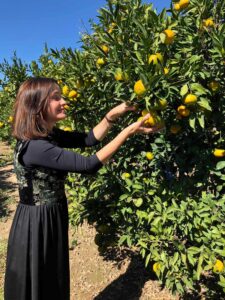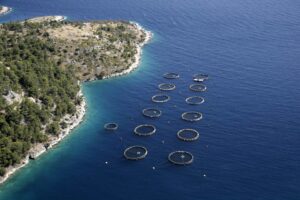Until 2027. Croatia has almost 3.8 billion euros from EU agricultural funds.
Our agricultural policies are focused on developing agriculture into a sector that will be more productive, market-oriented, more efficient across the chain and more competitive for Diplomacy&Commerce says Marija Vučković , minister of agriculture. In the coming period, it is necessary to further increase the value generated by agricultural production, says minister of agriculture.

- Severe flooding has hit parts of Croatia and the damage is extensive. What are the state and specifically the Ministry of Agriculture doing in concrete steps to help farmers in the area?
I would like to highlight the role of civil protection systems in minimizing the consequences of these disasters and the amount of hard work they put in to help our citizens and– we are thankful there were no human casualties. Unfortunately, damage done to agriculture is significant. We reacted promptly and provided an extraordinary grant worth EUR 4 million from the State Budge with the possibility of increasing funds for this purpose, if needed. This is not the first time that the Government of Andrej Plenković and the Ministry of Agriculture have provided support to farmers due to damages in agriculture; We have also applied this model in 2021 and in 2022 to address the consequences of hail and drought in the Požega Slavonia County.
There is also a possibility for farmers to receive support from the Rural Development Fund for restoration of resources damaged by natural or other catastrophic events. This support can be used for co-financing investments related to the rehabilitation of agricultural land, agricultural facilities, as well as repair or procurement of agricultural machinery and more. We will also continue co-financing of agricultural production insurance policies as a risk management measure.
All things considered, Croatia is committed to improving the crisis mechanism on the level of the entire European Union; During the last Agriculture and Fisheries Council in Brussels we shared information about floods and damage caused to agricultural areas, buildings and machinery and requested the activation of every possible form of assistance, either in the form of agricultural reserve or other instruments available.
- The war in Ukraine, disruptions to the world’s food supply continue. The measures you have taken to mitigate the effects of the crisis have yielded certain results. What do the numbers say and what measures can we expect in the future?
Russia’s aggression against Ukraine has changed the geopolitical and social circumstances in Europe and the world, and our farmers operate in unprecedented circumstances. Support measures of the Government of the Republic of Croatia were comprehensive. Last package of measures is worth EUR 1.7 billion and provides strong support to all citizens, but also to our agriculture, fisheries and forestry. Among other things, it includes EUR 31 million in aid to offset the growth of production costs in the livestock and plant production sectors, as well as support for the use of renewable energy sources in agriculture, assistance to small dairies, the fisheries and aquaculture sector and entrepreneurs engaged in wood processing and furniture production activities.
Despite all the disruptions, food security has not been at risk, and this Government and Ministry will continue to do everything to keep it that way. The value of agricultural production in the mandate of this Government is continuously growing.
Also, the agri-food sector improved in terms of export coverage of imports (70.9 % in 2022) – this shows that our support measures have been effective and well targeted, but also speaks of the great dedication and hard work of Croatian farmers.
Although the situation in Croatian agriculture is far from ideal, the positive indicators mentioned above are proof that the sector is resilient and of exceptional importance to this Government.

- Your ministry covers a lot of areas in the field of agriculture, fisheries, forestry, rural development, management and disposal of agricultural land owned by the state, agricultural policy, market and structural support in agriculture, food and tobacco industry and veterinary medicine. Where do you see the biggest problems and how to solve them? How understanding do farmers have and how would they rate your cooperation?
We foster dialogue and consider the feedback – both positive and negative – that farmers send us, mostly through our close and continuous cooperation with the Croatian Chamber of Agriculture and other representatives of the sector. Sectoral dialogues are a way to constructively and effectively address the challenges we face and we will continue to do so.
Unfortunately, diary sector has been continuously faced with challenges, and we are currently preparing a support for development of the dairy sector in the Republic of Croatia until 2030. We want to increase the number of cows, sheep and goats in milk production, productivity and ensure the necessary processing capacity. We expect to increase the population of cows, sheep and goats in milk production and the total milk production in Croatia to about 600 million liters of cow’s milk, 8.4 million liters of sheep and 11.2 million liters of goat milk by 2030.
Also, we continue our work to help the pig sector overcome severe disruptions due to rising prices of animal feed and energy products. Pig farmers have faced many challenges in their production throughout European Union. We have supported the establishment of reproduction centers, new pig farms, and secured additional funds for processing and creating added value.

- What are the financial resources provided for agriculture and fisheries in the coming period and what are the main objectives of these investments?
In the period 2023-2027 we have almost 3.8 billion euros at our disposal from EU agricultural funds. Additional national co-financing is available to farmers and the Government headed by Andrej Plenković raised the national contribution rate from 15% to 20%, thus increasing the total amount for the five-year period by EUR 103.5 million.
Our agricultural policies are focused on developing agriculture into a sector that will be more productive, market-oriented, more efficient across the chain and more competitive. Increasing efficiency, diversification and differentiation of products are inevitable in the process of structural transformation of the sector. In the coming period, we will further help our farmers modernize production potential and improve efficiency, as well as optimize production through diversification and innovation, which will ultimately result in job creation in rural areas and an increase in farmers’ incomes.
Furthermore, the National Recovery and Resilience Plan secures investments in agriculture worth EUR 131 million, for investments in the construction and equipping of distribution centers for fruits and vegetables, land consolidation, improvement of monitoring of agricultural land, digital transformation and establishment of food banks.
The new Fisheries and Aquaculture Programme, worth 348 million, will ensure continuity and give new impetus to the development of our fisheries and aquaculture sector. The funds available to Croatia through the new European Fund for Maritime Affairs, Fisheries and Aquaculture is the seventh largest by the amount of funds, out of a total of 26 Member States, and recently the Government adopted a EUR 88.5 million National Plan for the Development of Aquaculture.
We are proud of our country’s natural resources and hardworking farmers and fishermen, and we will continue to create preconditions for them to strengthen and grow their production.
- Where is Croatian agriculture today in relation to similar countries in the EU and where is the difference compared to neighboring countries?
In the coming period, it is necessary to further increase the value generated by agricultural production; We have defined development needs, objectives, priorities and activities that will result in increase in productivity and competitiveness of our agri-food sector, strengthen the sustainability and resilience of agricultural production to climate change, restore the rural economy and improve living conditions in rural areas, as well as encourage innovation in the agri-food sector.
Use of European funds is one of the ways in which we can strengthen the Croatian economy, and we have proven that we know how to use the funds we have at our disposal – EUR 2.6 billion has been disbursed from Rural Development Programme, including EUR 319.6 million that has been paid to date as a part of important investments in local infrastructure in rural areas. It brought as many as 219 kindergartens across Croatia, 71 community centers and cultural centers and 60 fire houses.
Concurrently, implementation of the Operational Programme for Maritime Affairs and Fisheries of the Republic of Croatia resulted in EUR 47.13 million of support for investments in 10 fishing ports. Moreover, 261 fishing vessels have been modernized, 230 projects have been invested to improve the marketing of fishery and aquaculture products, and 5 new and 25 existing fish processing plants have been built, modernized and equipped.
- What are you most proud of as a minister of what you have done so far?
We initiated demanding reforms, improved the legislative framework, adopted the missing strategic documents, regularly contracted funds for income and investment support to farmers, and always strived to respond as quickly as possible to many crisis situations – and we will continue to do so. But that is, in my opinion, simply our job. Above all, I am proud of the hardworking and dedicated Croatian farmers and fishermen, but also of the work of the administration. They continue to show incredible and unwavering commitment to their work, which plays a vital role in our society. This serves as a motive for me to do more and better.